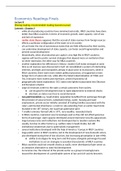Economics Readings Finals
Lecture 8
Missing reading: recommended reading Giacomo Luciani
Cammet – Chapter 9
- while all oil-producing countries have remained autocratcc RRLP countries have done
better than RRLr countries in terms o economic growthc state capacit,c rule o law
and lack o repression
- rentier state theo ry supposes that the accrual o state revenue rom oreign sources
efects a partcular confguraton o the state vis-v-vis societ,
- oil can oster the rise o autonomous states that are little infuenced b, their societ,c
can undermine development o state capacit,c can oster social ragmentaton and
prevent social development
- theoretcall,c when oil producton per capita is ver, high like in RRLP countriesc
regimes will tend to pre er survival strategies that depend more on renterism than
on sheer repressionc the other wa, or RRLr countries
- another explanaton or diferences is histor,: modern Gul states emerged at same
tme as oil reserves were discovered in Gul c oil consolidated a s,stem o interlocking
interestsc privileges and monopolies alread, in place prior to its discover,c while in
RRLr countriesc there were more violent politcal processesc oil supported a more
benign orm o autocratc rulec while afer the ailed industrialisaton o 1960s and
70sc it became more violent and repressivec armies fnanced b, oil
- geographicall, based explanaton: GCC states onl, lightl, incorporated into Ottoman
and European empires
- large oil revenues con er to the state a certain autonom, rom societ,
o can be good or development due to rapid adjustments to external shocks
o also badc as states react less to social demands
- neo -patrimo nialism e.g. Saudi rrabia: populaton benefted rom patronage through
the provision o social servicesc subsidised energ,c waterc housing and state
emplo,mentc private sector initall, consisted o trading amilies associated with the
rulersc patrimonial inheritance: a claim to rule extending rom an earlier Saudi state
ounded in the 18th centur,c Ibn Saud had paternalist spirit
- 7 smaller emirates ormed UrE in 1971c ver, wealth,c rewarded clients
- in RRLr countriesc repression was increasingl, used as the, did not aford generous
orms o patronagec state capacit, developed around repressive securit, apparatuses
- large bureaucracies and insttutons not developed due to taxaton s,stems like
usuall,c but due to other actors e.g. wel are state in Saudi rrabiac but stll
insttutonal weaknesses due to paternalistc management
- several insttutons developed with the help o rmerica / Europe in RRLP countries
- large public sector in RRLP countriesc led to the development o new domestc actorsc
also developed during tme o low oil pricesc but increasing privatsaton in late 1990s
o abilit, to strategies or long term and fnd space alongside patronage- ocused
insttutons to act on strategies is essental characteristc o RRLP countries
- RRLr countries could not smooth shocks as easil,c never developed private sector as
an attractve alternatve to state-led development
- rs incomes risec the interest o the private sector as a group increasingl, leans
toward the development o a predictable s,stem o law and civil societ, becomes
, more inclined to hold the civil service and government accountable or their
per ormance in delivering public services -> supports economic development
- In the GCC statesc the clientsaton o societ, ragmented the natve populaton into
vertcal networksc all reliant on subsidies and government emplo,ment ->
ragmentaton restricted development o a class-based social structure
- Oil producton requires less labour -> less labour organisatons or social organisatonc
onl, business associatons to support rulers’ decisions in economic re orms
- Private sector mostl, disconnected rom societ,c gives them less potental or actve
natonal role
- Harsh working conditons or oreign workersc social exclusionc etc.
- Dutch Disease: large infux o oil disturbs the process o development and can make
an oil-producing countr, worse of than it was without oil due to less diversifcaton
and autocratc rulers -> less growth
- Large oil revenues afect the exchange rate b, access to large amounts o oreign
exchange (price o traded to non-traded goods) -> raising suppl, o oreign exchange
in the local market -> less compettve internatonall, -> reduced diversifcaton
- Industrialisatio n challenge: oil countries are ofen dominated b, service sectorc but i
the, lose oil resourcesc the, have to move back to industr, -> sometmes hard
- Private sector in GCC countries mainl, made up o expats
- Efects o the Dutch Disease have been quite muted in the GCC countriesc as the, do
not allow oreign labour to take up long-term residencec which encourages ree fow
o remittances and a large share o the labour earnings go abroad and do not
augment the domestc demand or non-tradable goods
- RRLr countries do not have important labour infows and cannot aford a strateg, o
isolatng their natonal labour rom the efects o the labour marketc high
unemplo,mentc most jobs or ,outh in low-productvit, in ormal service sector
- Civil administraton in the GCC countries has grown a lotc mostl, in public sector or
natve workers due to higher wages and general working attudes
- Because o wage diferentals and the lack o job securit, and prestgec locals do not
want to take the kinds o jobs that man, oreigners accept -> natonalisaton
campaign aimed at reducing the emplo,ment o immigrants and reducing natonal
unemplo,ment -> most success ul in the public sectorc limited in private one
o Foreign labour orce percentage onl, slightl, declined in Saudi rrabia
- Rise o educated unemplo,mentc similar or RRLr and RRLP countries but or
diferent reasons (no jobs available in RRLrc jobs in RRLP just or oreigners)
- Private sector in RRLr countries is extremel, weakc dominated b, a narrow range o
cronies -> unemplo,ment high
- Oil glut developed in later 2014 due to low demand and lush suppl, -> prices ell
- Twin challenge: diversi , econom, and create new industries that can create
productve jobs -> state can either invest unds directl, or it can channel some unds
to the private sector
o frst soluton pre erred in the 1970sc but then it became a drain on resourcesc
inefcientc especiall, ailure or RRLr countries e.g. rlgeria
Saudi rrabia success ul in agriculture in 1970s due to subsidies -> sel -
sufcient in wheat producton b, 1984 -> exports peaked in 1992
o Second soluton more used in recent ,ears in GCC countries
, 5 wa,s in which oil revenues have been trans ormedc historicall, into
private wealth: 1. Local representaton o oreign companiesc 2. Land
distributon and real estate actvitesc . Government procurementc 4.
Government’s support or industr,c 5. Promoton o agriculture
- Dubai model: carved out niche in state-owned transportc logistcsc and real estate
services -> exported across ME and be,ondc are globall, compettve
- Support or business sector increasingc tooc eforts to develop fnancial markets
- Currentl,c private investment is larger than public investment in all GCC countries
except or Saudi rrabia
- High energ, subsidies in GCC countries
- Major challenge o oil is its volatlit, -> boom-bust c,cle
- Earl, 1980sc revenues collapsed -> deep investment cutsc but state emplo,ment kept
growing
- 1990s: Gul War led to large fscal defcits or Saudi rrabia -> debtc but helped b,
second oil boom -> led to surplus in the end
- during second oil boomc most GCC governments expanded expendituresc but unlike
their response to the frst boomc in rastructure spending was more subduedc
spending on social programs and salaries rose the most instead
- no role or monetar, polic, in the GCC because the exchange rate is pegged to the
dollarc but power ul fscal polic, used
The Renter State in the rrab World – Beblawi
- rccording to rdam Smithc rent is a reward or ownership o all natural resources like
mines or land -> income derived rom the “gif o naturee
- Diference between earned income and efortless accrued rent
- Social uncton o the renter met with discontent b, some parts o the populaton
- There is no pure renter econom,c ever, econom, has some elements o rent
o r renter econom, can be defned as one where rent situatons predominate
- relies on substantal external rentc while a productve econom, has internal rent
- Onl, ew are engaged in the generaton o rent (wealth) in a renter state -> the
majorit, being onl, involved in the distributon or utlisaton o it
- In a renter statec the government is the principal recipient o the external rentc
related to the act that onl, ew control the external rent
- Renter mentalit, embodies a break in the work-reward causaton
- Citizenship becomes a source o economic beneftc diferent la,ers o benefciaries o
government rent are created
- With no taxesc citizens are ar less demanding in terms o politcal partcipaton
- Governments provide their populatons with a wide range o public goods and
services like de encec natonal securit,c educatonc healthc emplo,mentc etc.
- Some people in public ofce have used their positons or private gain
- The government is also the major emplo,er in the econom,
- Oil rent gave rise to a secondar, wave o rent generatons (second order rents) in the
areas o real estate and stock market speculaton
- Land has pla,ed a major role in the process o trickling down oil mone, rom
governments to private individuals
- Expatriates used to fll the gap in available manpower in oil states assume productve
actvites to sats , the growing needs o the societ,






